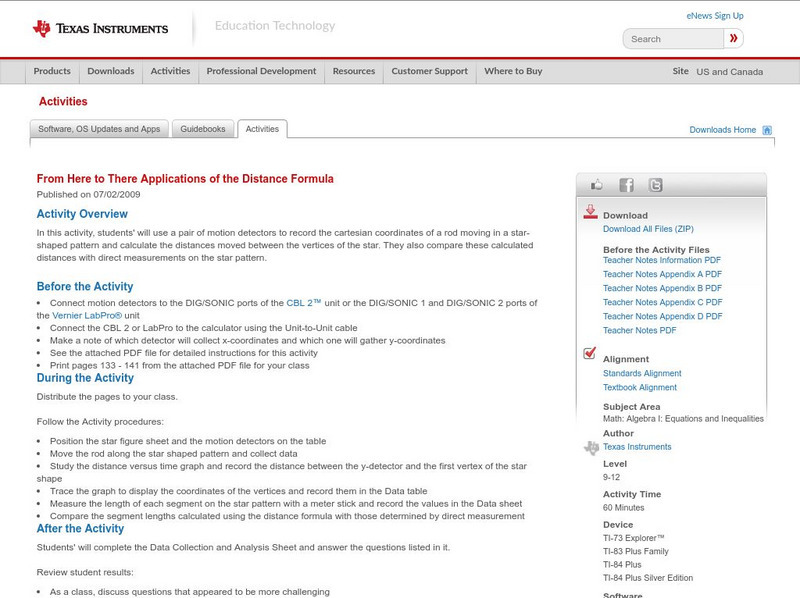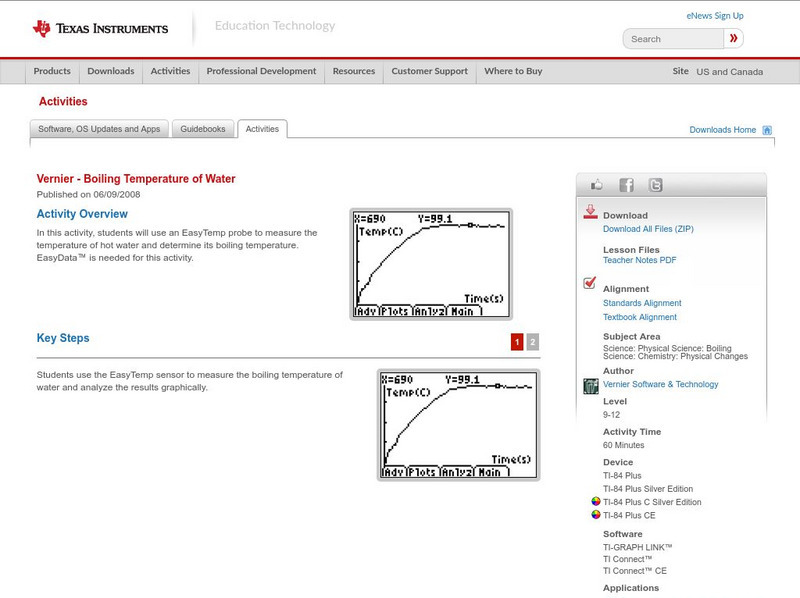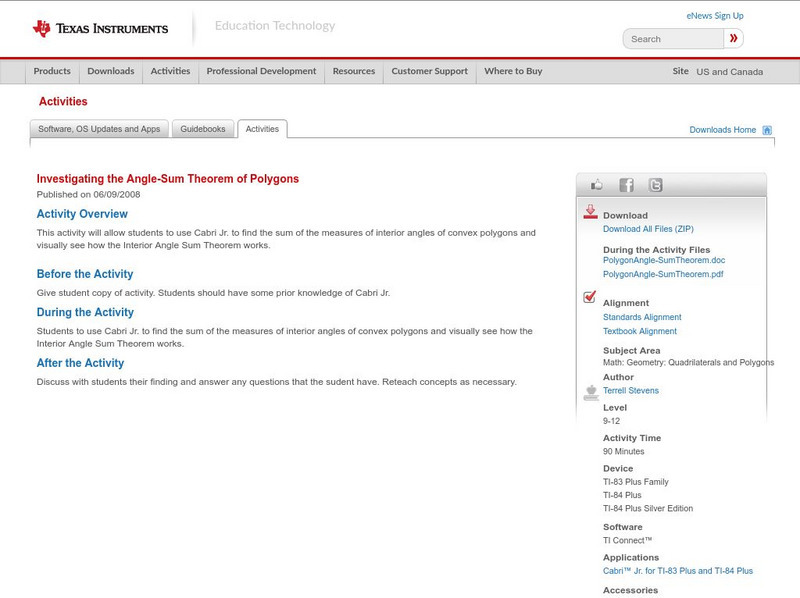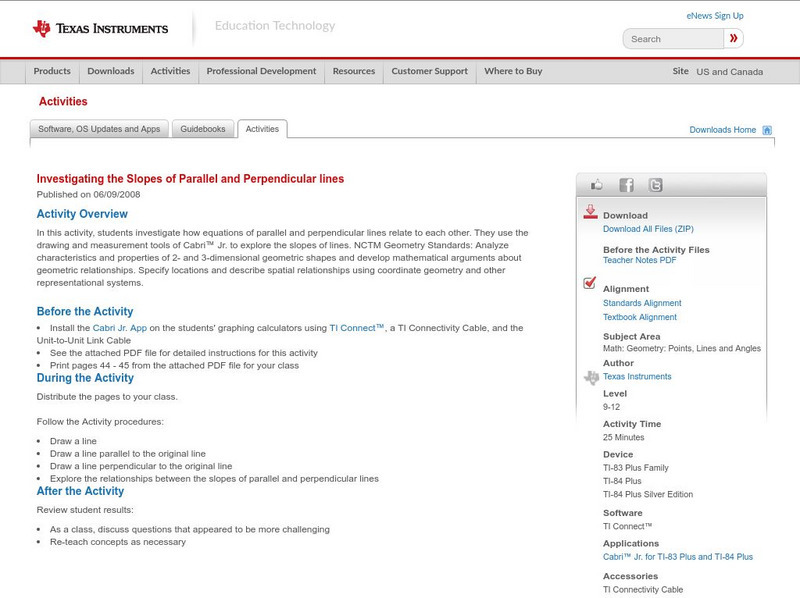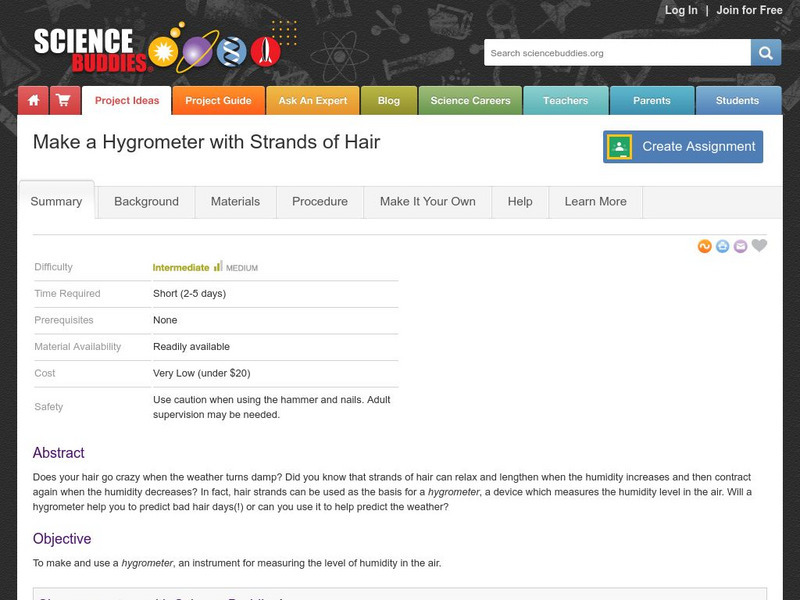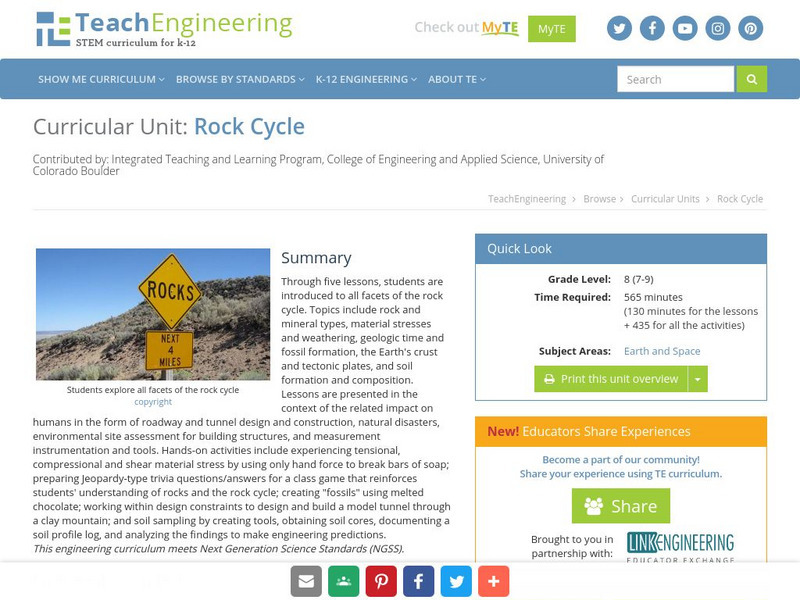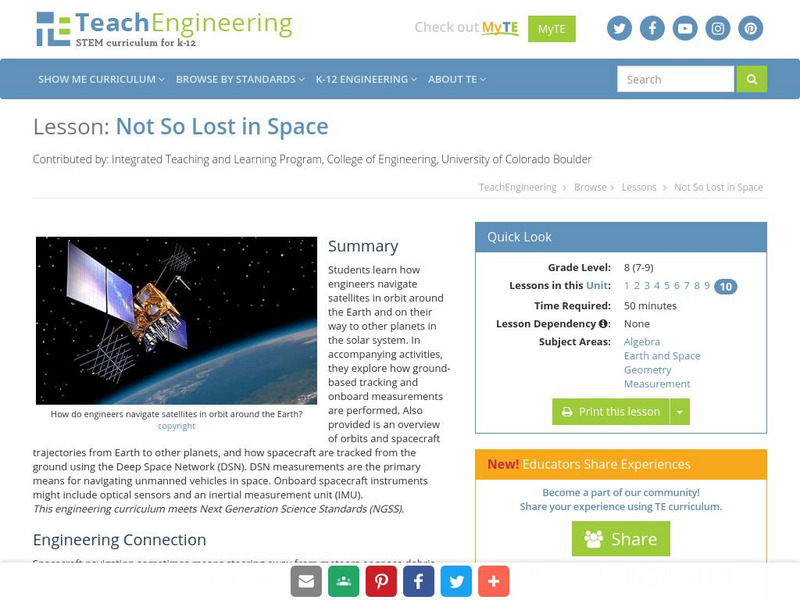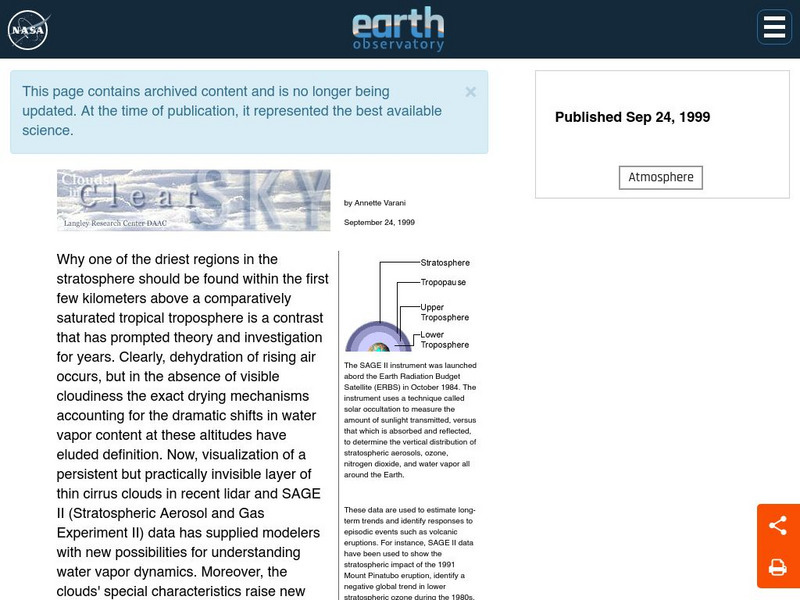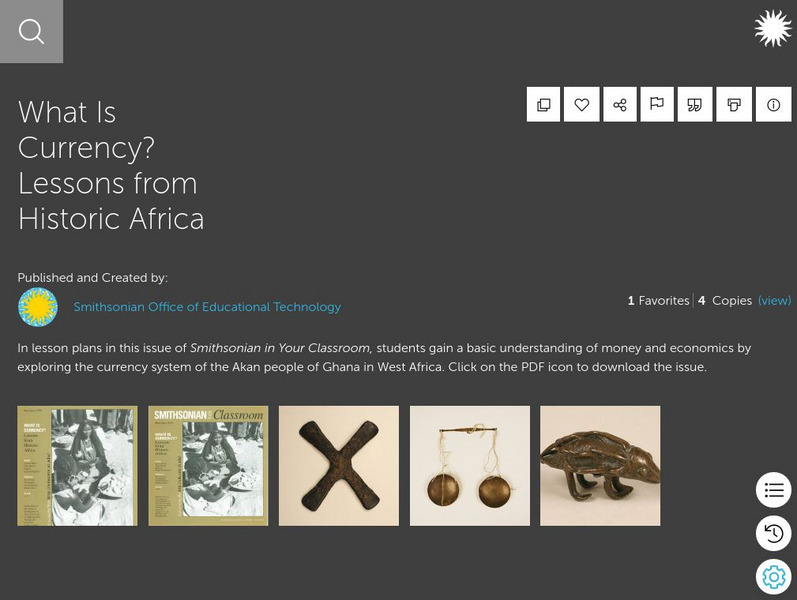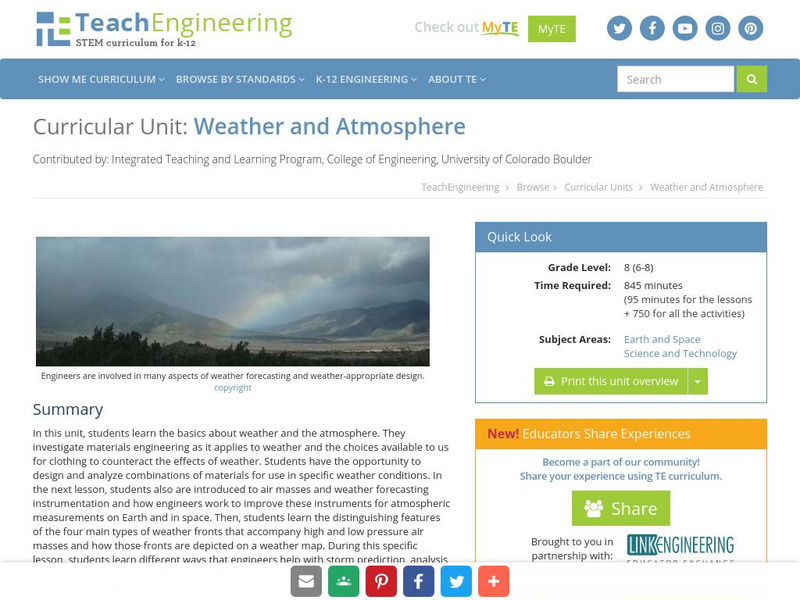Hi, what do you want to do?
Texas Instruments
Texas Instruments: What Does a Buffer Do?
Buffers are solutions that resist a change in pH. In this activity, students will add HCl dropwise to a measured amount of water, monitoring the pH. Students then repeat the process, using a simple buffer prepared by combining baking...
Texas Instruments
Texas Instruments: From Here to There Applications of the Distance Formula
In this activity, students' will use a pair of motion detectors to record the cartesian coordinates of a rod moving in a star-shaped pattern and calculate the distances moved between the vertices of the star. They also compare these...
Texas Instruments
Texas Instruments: Boiling Temperature of Water
In this activity, students can use an EasyTemp probe to measure the temperature of hot water and determine its boiling temperature. EasyData is needed for this activity.
Texas Instruments
Texas Instruments: Investigating the Angle Sum Theorem of Polygons
This activity will allow students to use Cabri Jr. to find the sum of the measures of interior angles of convex polygons and visually see how the Interior Angle Sum Theorem works.
Texas Instruments
Texas Instruments: Investigating the Slopes of Parallel and Perpendicular Lines
In this activity, students investigate how equations of parallel and perpendicular lines relate to each other. They use the drawing and measurement tools of Cabri Jr. to explore the slopes of lines. [Requires Adobe Reader.]
Texas Instruments
Texas Instruments: Holt Physics: Brightness of Light
This probeware version of the Skills Practice Lab Brightness of Light from the chapter Light and Reflection uses a light probe to measure the intensity of light at different distances from a light source.
Texas Instruments
Texas Instruments: Body Cooling Rate of Animals
Students make two models to stimulate the cooling rate of different skin surface areas. They use a Temperature Sensor to measure the cooling rate of the models. The students also compare the cooling rates of the models to determine the...
Texas Instruments
Texas Instruments: Numb3 Rs: It's All Connected
Based off of the hit television show NUMB3RS, this lesson uses students' knowledge of graph theory (networks) to introduce two measures of centrality (how connected a particular node is to the entire network), known as degree centrality...
Science Buddies
Science Buddies: Make a Hygrometer With Strands of Hair
Does your hair go crazy when the weather turns damp? Did you know that strands of hair can relax and lengthen when the humidity increases and then contract again when the humidity decreases? In fact, hair strands can be used as the basis...
Cuemath
Cuemath: Temperature
The article explains temperature. Specifically, you will learn about the temperature scale, temperature scale conversions, and the types of instruments used to measure temperature. Included are solved examples and interactive problems...
TeachEngineering
Teach Engineering: Rock Cycle
Through five lessons, students are introduced to all facets of the rock cycle. Topics include rock and mineral types, material stresses and weathering, geologic time and fossil formation, the Earth's crust and tectonic plates, and soil...
Other
Hellenica World: Ancient Greek Medical Inventions
Learn about various medical devices invented and used by the ancient Greeks including "a portable waterclock used to measure the pulse of patients" and a "surgical instrument, known as 'the spoon of Diokles.'"
Texas Education Agency
Texas Gateway: Sound Interference and Resonance: Standing Waves in Air Columns
By the end of this section, you will be able to define antinode, node, fundamental, overtones, and harmonics; identify instances of sound interference in everyday situations; describe how sound interference occurring inside open and...
Center for Innovation in Engineering and Science Education, Stevens Institute of Technology
Ciese Real Time Data Projects:collecting Weather Data and Keeping a Weather Log
Over a period of two weeks students will use their class-made instruments to measure and record weather data. Students will also compare their data to online weather data. The final activity involves analyzing the collected data to look...
TeachEngineering
Teach Engineering: Not So Lost in Space
Students learn how engineers navigate satellites in orbit around the Earth and on their way to other planets in the solar system. In accompanying activities, they explore how ground-based tracking and onboard measurements are performed....
NASA
Nasa Earth Observatory: Clouds in a Clear Sky
This article introduces the different layers of the atmosphere and the clouds that are formed there. Scientists use instruments such as the SAGE 11 that help to measure amounts of sunlight, water vapor, and other conditions that affect...
Creative Science Centre
Creative Science Centre: Mobile Phone Absorption Wavemeter
An absorption wavemeter is a device which can make measurements on the strength of radio emissions and so this instrument is an essential item for investigating the mobile phone. In principle an absorption meter is a simple device that...
Enchanted Learning
Enchanted Learning: English (Esl) Label Me! Printouts
Over 100 handouts with answer sheets you can print and use to help build English vocabulary. Numerous topics and themes are covered: everyday words, math terms, seasonal and holiday words, geographical terms, animals, opposites, parts of...
Smithsonian Institution
Smithsonian Learning Lab: What Is Currency? Lessons From Historic Africa
From the Smithsonian, this site offers lessons and resources on currency, its use (in the form of gold dust, salt, or metal objects) as an instrument of trade in historic Africa, and its requirements as an instrument of trade in the...
Instituto Latinoamericano de la Comunicacion Educativa
Red Escolar: Barcos en Alta Mar
In Spanish. Play submarine by using trigonometry, learn the law of sines and cosine, build an instrument to measure angles and distance and find out who was the father of Trigonometry.
TeachEngineering
Teach Engineering: Weather and Atmosphere
In this unit, students learn the basics about weather and the atmosphere. They investigate materials engineering as it applies to weather and the choices available to us for clothing to counteract the effects of weather. Students have...
Curated OER
Unidentified Woman and Edward Dorris Mc Alister (B. 1901)
An unidentified woman and Edward Dorris McAlister (b. 1901) are shown working at the Smithsonian Institution's Division of Radiation and Organisms in Cambridge, Massachusetts. The apparatus shown was being used to measure the strength of...
Dartmouth College
Dartmouth College: Digital P H Meter
This site explains how a digital pH meter uses an electrode to measure the pH of a solution Find out how to use this instrument in this informative site.






